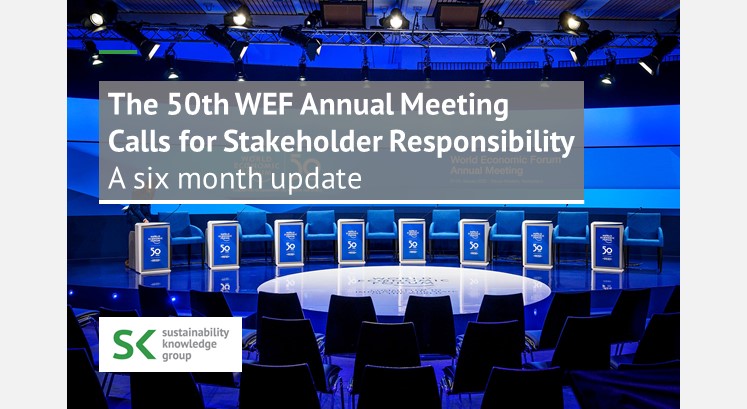Earlier this year on January 21-24, the annual meeting of the World Economic Forum (WEF) celebrated its 50th meeting in Davos, Switzerland. This meeting focused on the responsibility of stakeholders, which has been the concept of the forum since its establishment in 1961.
Every year, the WEF brings together world leaders, heads of state, prime ministers and global stakeholders, with the goal to shape global, regional and industrial agendas for a coherent and sustainable world. For the last 50 years, the Forum has initiated change for global programs, historical shifts, innovations and collaborations to address pressing issues. The Forum focuses on a different theme every year and achieves the following: building awareness, shaping government agendas and driving collective action to improve the state of the world. A Coalition of Epidemic Preparedness Innovations, Improving renewable energy transition and aiding heavy industry reach net zero emissions by 2050 are some amongst several successful projects initiated by WEF since its launch. This year, under the theme of “Stakeholders for a Cohesive and Sustainable World“, the Forum brought together over 3,000 participants across the world, defining the concept of “stakeholder capitalism”.
The Forum focused on the responsibility of stakeholders to take concrete action and address the most pressing environmental, social, and governance issues (ESG). It also calls on the stakeholders to help governments and international institutions track progress towards the Sustainable Development Goals (SDGs) and the Paris Agreement, and facilitate discussions on technology and trade management.
Outcomes of the 2020 annual meeting
This year’s annual meeting of the WEF highlighted several results of progress in the six main areas of the Forum:
- Ecology – climate change risks
- Economic – long-term debt removal
- Technology – deployment of 4th Industrial Revolution technologies
- Society – reskill and upskill 1 billion people by 2030
- Geopolitics – resolve conflicts in global hotspots
- Industry – drive enterprise
Over 160 high-impact lighthouse projects were presented during the forum to the six main axes of improving the world. Most prominently was the stakeholders focus on supporting efforts to develop a basic set of common standards and disclosures that can be used to measure the progress of the private sector against ESG. Additionally, the Reskilling Revolution Platform was launched to provide better education, skills, and jobs for a billion people by 2030.
Although the WEF meeting took place while the COVID-19 was still in its infancy and many countries are now COVID-19 free or have put in place measures to prevent its spread, the Forum referred to it during this meeting. The Coalition for Epidemic Preparedness Innovations (CEPI), announced three new vaccine development programs for COVID-19 and the Vaccine Alliance (GAVI) announced the arrival of vaccines and immunization to 760 million children and continued vaccination campaigns.
Regarding the efforts made to accelerate progress towards SDGs, Frontier 2030 was launched to take advantage of the technologies of the fourth industrial revolution to accelerate SDGs. A strategic partnership has also been signed between the WEF and the Organization for Economic Co-operation and Development (OECD) to accelerate progress towards inclusive and sustainable growth worldwide.
The annual meeting was climate neutral for the fourth year in a row, with a host of new initiatives to enhance resource efficiency and further reduce emissions. Klaus Schwab, the Forum’s Founder and Executive Chairman, asked all members and partners to commit to achieving net carbon emissions by 2050 or earlier.
Six months after the meeting: What is the progress?
Looking back at this meeting six months later, the spread of the COVID-19 paralyzed the world, and much of the work of the WEF Meeting 2020 calls is left behind.
Climate action has been one of the main themes of the 2020 WEF meeting. Since the COVID-19 spread, climate change has taken a back seat, and reducing the spread of the COVID-19 has been placed on the political and commercial agendas in 2020 around the world. Although pandemic lockdowns have reduced pollution and greenhouse gas emissions, concrete plans at national and global level to take action toward climate change are still slow.
Despite hopes since the launch of the Reskilling Revolution Platform during the Forum this year, to provide jobs for one billion people by 2030. The COVID-19 has caused the global economy to shrink, and thus unemployment is higher than ever. According to the International Monetary Fund, unemployment is expected to rise across the board, from 3.7% in 2019 to 10.4% this year.
Although the GAVI announced at the WEF meeting that vaccination campaigns were continuing, vaccination programs got postponed. Measles and Polio vaccination programs have been postponed due to concerns about the spread of COVID-19 through the required vaccination contact. The World Health Organization also issued guidelines to help countries maintain immunization services, but recommended that mass vaccination campaigns be suspended temporarily.
Stakeholders for a Cohesive and Sustainable World
Despite the progress made during this WEF meeting, improvement plans, and promising initiatives, the decline of COVID-19 made all the issues raised in the six areas more urgent and challenging. This emergency requires global cooperation between governments, international organizations, and the business community.
In this spirit, the WEF launched the COVID Action Platform to enhance multi-stakeholder collaboration between the public and private sectors. To make a greater change in sustainable business, stakeholders and leaders need to step up their efforts and collaborate to mitigate the risks of COVID-19, to achieve tangible results, and reach for a coherent and sustainable world.
Photo by Fabrice Coffrini/AFP via Getty Images

